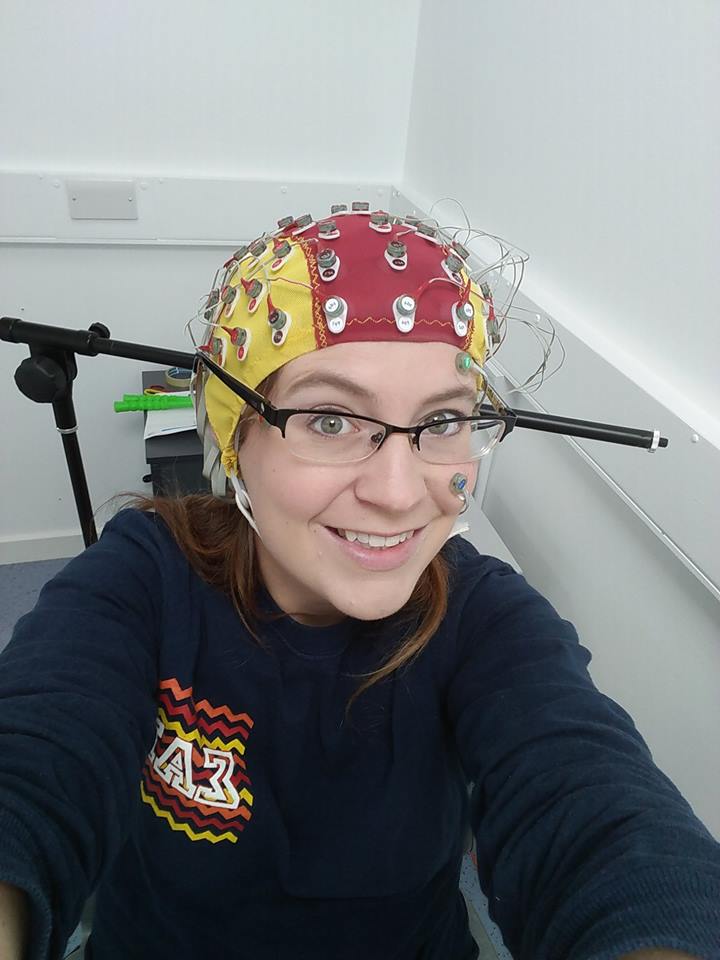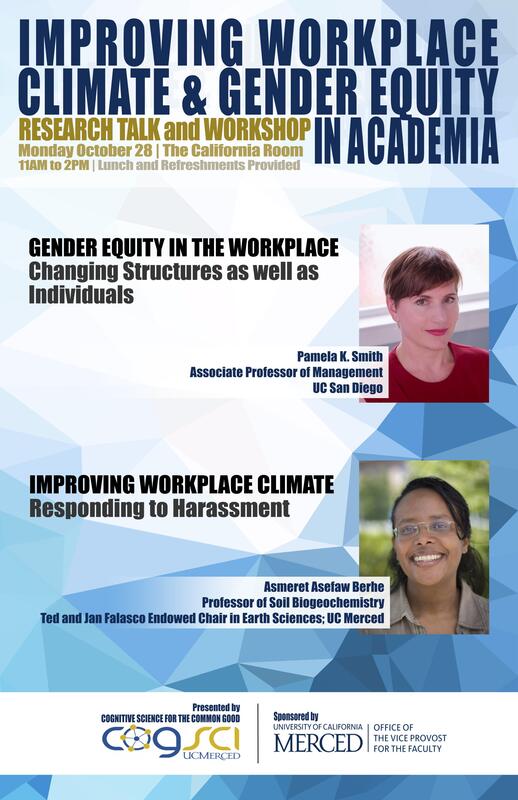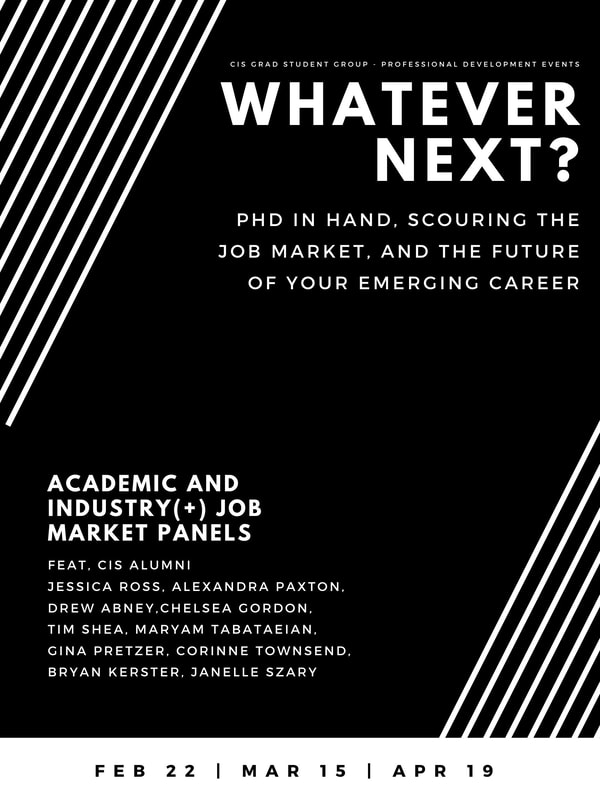In addition to research and teaching, the service work we do in academia is critical to the success of our colleagues and fields of study. My service to the profession has included reviewing for the Journal of Motor Behavior and Philosophical Transactions of the Royal Society B. Closer to home I strive to ensure that my colleagues and peers can work in an environment that is supportive to their mental health and academic success. To that end, I was a co-founder of the Cognitive & Information Sciences (CIS) Graduate Student Group at UC Merced. We founded this group to build a stable channel of communication between graduate students and faculty, as well as to facilitate opportunities for the informal interactions which fuel well-being and the sharing of innovative ideas. In my two-year role as Professional Development Officer, I organized nine different professional development events designed to help my colleagues in everything from navigating support structures during graduate school, to giving effective presentations, the practicalities of open science, and finding a job after graduation.
I have brought my organization and attention to detail to administrative roles within my department and across the UC Merced graduate program as a whole. Most recently, I was engaged on an administrative fellowship to review the new Policies and Procedures document for the CIS Graduate Program and to create a comprehensive FAQ and online guide with Program Milestones for the PhD and newly created Masters of Science degree. I have also spent time in committee work with the Graduate Student Association (GSA) to revamp the Graduate Students Rights & Responsibilities document in communication with administrators in the Graduate Division. As a Delegate for the GSA, I also worked on committees to keep UC Merced administration abreast of Transportation, Food, and Housing Insecurity as the issue related to both graduate and undergraduate students. My dedication to our university and to the Cognitive and Information Sciences program in particular led CIS faculty to nominate me for the Graduate Student Spotlight Award in October 2021 in recognition of outstanding contributions to scholarship and service.
Below I highlight two important events which I organized or co-organized in service of the graduate students in our department, and to build strong foundations for the future students, universities, clients or companies to which my colleagues will bring their experience and training.
I have brought my organization and attention to detail to administrative roles within my department and across the UC Merced graduate program as a whole. Most recently, I was engaged on an administrative fellowship to review the new Policies and Procedures document for the CIS Graduate Program and to create a comprehensive FAQ and online guide with Program Milestones for the PhD and newly created Masters of Science degree. I have also spent time in committee work with the Graduate Student Association (GSA) to revamp the Graduate Students Rights & Responsibilities document in communication with administrators in the Graduate Division. As a Delegate for the GSA, I also worked on committees to keep UC Merced administration abreast of Transportation, Food, and Housing Insecurity as the issue related to both graduate and undergraduate students. My dedication to our university and to the Cognitive and Information Sciences program in particular led CIS faculty to nominate me for the Graduate Student Spotlight Award in October 2021 in recognition of outstanding contributions to scholarship and service.
Below I highlight two important events which I organized or co-organized in service of the graduate students in our department, and to build strong foundations for the future students, universities, clients or companies to which my colleagues will bring their experience and training.
Workplace Climate & Gender EquityVertical Divider
Together with Dr Colin Holbrook & CIS graduate students Alexandria Pabst, & Emilio Lobato, I co-organized this Fall 2019 Cognitive Science for the Common Good Research Talk and Workshop
Speaker: Pamela K. Smith; Associate Professor of Management, UC San Diego Title: Gender Equity in the Workplace: Changing Structures as Well as Individuals Abstract: As a psychologist, I am accustomed to viewing the world through the lens of individual-level actions and change. Similarly, much popular writing on gender equity in the workplace, such as Sheryl Sandberg’s book Lean In, has focused on what individual women can do to achieve more power. I will first review research on what individual-level changes work for women. However, an individual focus ignores how much of gender disparities and inequities are created and reinforced by the way workplaces are structured. As an example, I review my research on gender representation in symposia over 13 years of the Society for Personality and Social Psychology’s annual convention. I end with some discussion of how better workplace structures can be put into place to support gender equity. Speaker: Asmeret Asefaw Berhe; Professor of Soil Biogeochemistry; Ted and Jan Falasco Endowed Chair in Earth Sciences Title: Improving Workplace Climate: Responding to Harassment Abstract: Harassment endangers the professional and personal well-being of individuals and their communities and contributes to hostile climates in science. It can exploit differences in religion, race, class, ability, sexual orientation, and gender identity and is especially toxic when perpetrated by people in positions of power, such as supervisors or advisors. The workshop goal is to raise awareness of the problem, discuss initiatives to address harassment as research misconduct, present practical strategies for reducing instances of harassment and for supporting its targets, and discuss ways for creating workplace climates that do not tolerate harassment. As a result of this session, participants will be able to identify: (1) different ways in which sexual and other types of harassment can manifest in research environments; (2) strategies for bystander intervention and for reporting harassment, and (3) resources to share with their home departments for cultural change. Find more resources on promoting a healthy workplace climate via diversity, equity, and inclusion here: https://aaberhe.com/equity/ |
Job Market PanelsIn Spring 2021, I invited 10 alumni from the University of California Merced Cognitive and Information Sciences PhD program a series of three Job Market Panels to speak to their experience transitioning from the PhD to their respective Academic and Industry positions.
As PhD students, we have ample advice from professors and from courses for entering the academic job market. What is often missing is concrete and up to date advice regarding the current academic job market, and the transition away from the PhD student experience. Our alumni featured in the Academic Job Panels discussed the experience of being a post-doc and what to do after the post-doc ends, balancing research and work as an instructor, the approach to finding a job within a university, as well as the importance of balancing your own life, including your partners, families, and hobbies, with your decision to pursue and engage in an academic career. Additionally, sometimes missing from the PhD experience is concrete and up to date advice regarding the industry job market, and other professions well-suited to the unique computational and data-science skills we gain in the CIS program. Our alumni featured in the Industry(+) job market panels discussed their transition from the PhD to industry (e.g. taking advantage of the internship & placement programs vs applying straight to industry or government positions), the interview and hiring process, and their general experience in their positions as compared to the time in the PhD program. Given the circumstances surrounding COVID19, each of our panelists also discussed any effect on their jobs as a result of the pandemic and speculated on the trajectory of industry and academic jobs in the future. |


